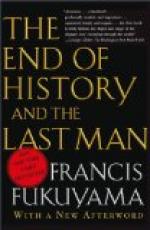|
This section contains 2,151 words (approx. 8 pages at 300 words per page) |

|
SOURCE: A review of The End of History and the Last Man, in American Historical Review Vol. 97, No. 3, June, 1992, pp. 817-9.
In the following review, Fritzsche provides analysis of Fukuyama's argument in The End of History and the Last Man.
Francis Fukuyama would not be at the RAND Corporation if he were an avowed postmodernist. But the implication of his thoughtful essay point in just that direction. Like many cultural theorists today, Fukuyama argues that there are no longer any overarching plots or designs that give prescribed meaning to our political endeavors. History with a capital “H” has come to an end, although the lower-case history of births and deaths and private aspirations persists. This is the case because the twentieth century has knocked out all the ideological challengers to the principles of the liberal democratic order. “The last man” left standing is a democrat and a capitalist...
|
This section contains 2,151 words (approx. 8 pages at 300 words per page) |

|


